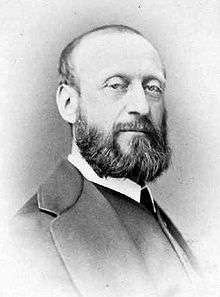Joseph-Henri Altès
| Joseph-Henri Altès | |
|---|---|
 Photograph of Joseph-Henri Altès by Pierre Petit in 1860. | |
| Born |
18 janvier 1826 Rouen |
| Died |
24 July 1895 (aged 69) Paris |
| Occupation |
Flautist Composer Pedagog |
Joseph-Henri Altès (18 January 1826 – 24 July 1895) was a 19th-century French flautist, composer and pedagog.
Biography
Born in Rouen, Joseph-Henri Altès was the son of a soldier. Violinist and conductor Ernest Eugène Altès was his younger brother. He began studying the flute at the age of ten and enrolled in the Conservatoire de Paris in December 1840.

Joseph-Henri Altès plays the flute, left of bassoonist Désiré Dihau.
Like his teacher, Jean-Louis Tulou, he played a western flute concert with four valves and only changes later for a Theobald Boehm model. As early as 1841, in the competition of the conservatory, it receives a second prize and the following year a First Prize. From 1848 to 1872, he was first flautist at the Orchestre de l'Opéra national de Paris and in 1868 he was the successor of Louis Dorus as a flute teacher at the Conservatoire de Paris, where he remained until 1893. Among his pupils were Georges Barrère and Adolphe Hennebains.
Altès is the author of a method of flute, Célèbre Méthode complète de Flûte[1] (1880) and left about 40 compositions, including 6 solos for the entrance competition at the Paris Conservatory and transcriptions or fantasies on opera themes.
Altès was friend with the painter Edgar Degas, who represented him in 1870, on the painting entitled L'Orchestre de l'Opéra housed at the Musée d'Orsay.[2]
He died 24 July 1895 in Paris. He is buried at cimetière de Montmartre (33rd division) with his wife, the opera singer Émilie-Francisque Ribault.
References
- ↑ Célèbre Méthode complète de Flûte
- ↑ Edgar Degas, L'Orchestre de l'Opéra, musée d'Orsay (Read online)
Bibliography
- (in German) U. Pešek et Ž. Pešek, Flötenmusik aus drei Jahrhunderten. Bärenreiter 1990.
- (in German) A. Goldberg, Porträts und Biographien hervorragender Flöten-Virtuosen -Dilettanten und -Komponisten. Moeck 1987 (Reprint v. 1906).
- (in German) Julia Soriano Rodríguez (éd.), Lexikon der Flöte, Laaber-Verl., Laaber 2009, ISBN 978-3-89007-545-7
External links
- Free scores by Joseph-Henri Altès at the International Music Score Library Project (IMSLP)
- Biography of Joseph Henri Altes (1826-1899)
- Altès, Portrait by Degas, 1868 (Metropolitan Museum of Art, New York)
- Portrait on Gallica